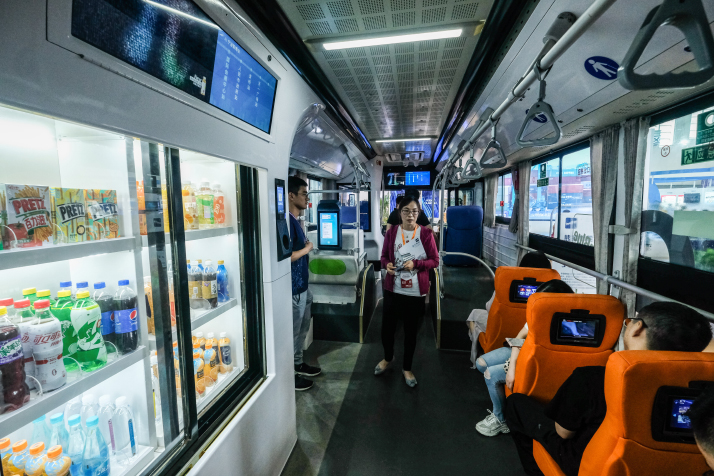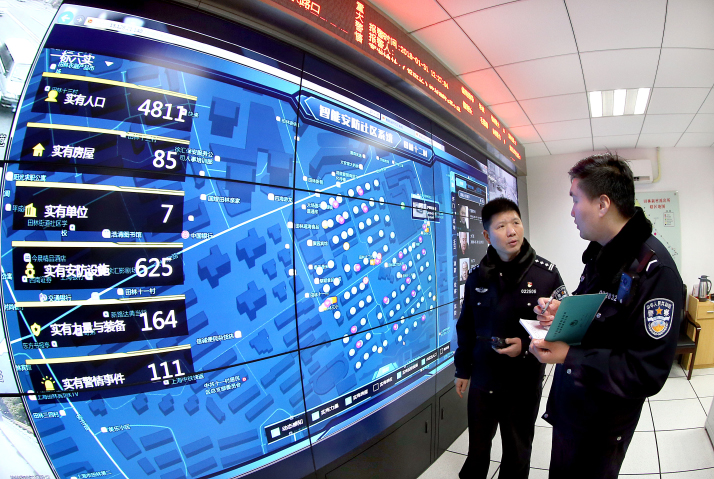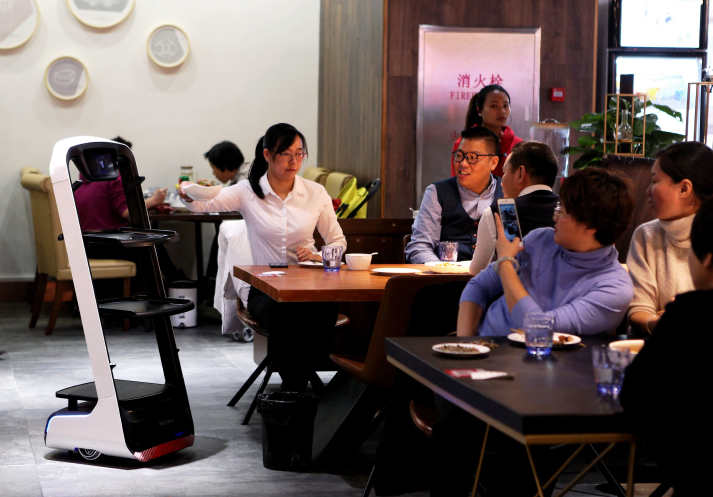|
||||||
|
||||||
| Home Nation World Business Opinion Lifestyle China Focus ChinAfrica Video Multimedia Columnists Documents Special Reports |
|
||||||
|
||||||
| Home Nation World Business Opinion Lifestyle China Focus ChinAfrica Video Multimedia Columnists Documents Special Reports |
| Nation |
| A Smart Life |
| China advances the development of intelligent cities |
| By Li Jing · 2019-12-13 · Source: NO.51 DECEMBER 19, 2019 |
 A smart bus on display at the China Smart City and Intelligent Economy Expo in Ningbo, Zhejiang Province, on September 6(XINHUA)
As night falls on Xiongan New Area, about 100 km southwest of Beijing, something unique happens: streetlights come on and automatically adjust their brightness according to the number of pedestrians and vehicles around them. Passersby casually sit on the benches beside the streetlights, where they can charge their phones on the poles' outlets and access a free Wi-Fi network. The streetlights are also equipped with a multifunction camera, enabling them to automatically collect and transmit traffic information. Since the first intelligent streetlights were erected on August 26 in Xiongan, what looks like a scene from a futuristic sci-fi movie is now part of local residents' day-to-day reality. "The smart devices and 5G stations use a 48-volt direct current, which is absolutely safe for humans, even in case of contact. This helps prevent any risk of electric shock during the rainy season," explained Guo Tianhong, a technician at the China State Grid branch in Xiongan. The new area was officially established in Hebei Province on April 1, 2017, and is an initiative to encourage the coordinated development of the Beijing-Tianjin-Hebei region. Among the many tasks during the construction of Xiongan, the first and most important one was building a new green and smart city. It has since established itself as a model for other smart cities being planned and built in China. However, this is far from China's first attempt in the field. In fact, the country has been moving along this path for many years.  Shanghai police officers check an intelligent public security system on January 31, 2018 (XINHUA)
Long-term exploration The concept of a smart city was first put forward by U.S. information technology giant IBM in 2008. However, since technology is constantly evolving, the definition of this concept has changed dramatically over the past 10 years. Moreover, as each country has a different understanding of the concept and its development priorities, there is currently no single definition of what constitutes a smart city. According to the China Wisdom Engineering Association, in simple terms, a smart city aims at increasing the efficiency of how city resources are used, improving urban governance and programs, and providing practical and efficient urban services to citizens through digital and computerized management. In order to promote a stable and regular approach to the construction of smart cities, the Chinese Government has formulated a series of plans and measures, setting up several research centers and launching pilot projects throughout the country. Since January 2013, the Ministry of Housing and Urban-Rural Development has announced the creation of 290 pilot cities, districts, counties and towns in three successive batches. In addition, several local governments have included smart city projects in their work schedules for the 13th Five-Year Plan (2016-20) period. By early 2018, more than 500 Chinese cities were planning to build or were in the process of building a smart city. In addition to the central and local governments, businesses play a critical role in building smart cities. According to Huang Qian, a professor at the College of Economics at Nankai University, the government should focus more on formulating plans, improving industrial policies and creating an innovative environment, while companies should actively take part in the actual, physical construction of smart cities. Maintaining an underground pipeline network is a major headache for modern cities. Excavation work on roads is not only labor and resource intensive, it also exacerbates public transit problems by blocking roads. To solve this challenge, Wuhan HopeTop Technology developed robots, leveraging recent breakthroughs in the fields of the Internet of Things (IoT) and artificial intelligence (AI). "As soon as a problem is detected such as a water leak, robots are inserted into the pipe, from where they will transmit data and images back to the control center. By analyzing this information with the help of big data technology, we can swiftly identify where the leakage point is located," Hu Zhen, HopeTop General Manager, told Beijing Review. In addition to raising efficiency, these new robots can help solve the problem of water waste. According to Hu, even before tap water reaches urban households, some of it is lost due to numerous cracks along the pipelines. The rate of water waste can reach up to 30 percent, which means that 30 tons are lost for every 100 tons of water going through the system. This is a major challenge on a global scale. Today, with the help of IoT technology and AI, even the smallest cracks can be identified and repaired in time. "For the long-term development of smart cities, the government must play the role of a general organizer, responsible for planning and promoting projects," said Feng Kui, a researcher at the China Center for Urban Development under the National Development and Reform Commission. "Governments, businesses and citizens each have their own part to play when it comes to the construction of a smart city, and the three must support each other." In recent years, several organizations and events related to the construction of smart cities have also been set up, such as think tanks, forums, exhibitions and even competitions. These are all platforms for experts, government officials and entrepreneurs to exchange ideas and explore the meaning of a smart city. Together, they can seek better solutions to the numerous issues they encounter in the building process. For example, during the 2019 World Internet of Things Exposition in Wuxi, Jiangsu Province in east China, a series of solutions related to smart cities were put forward in several areas, including energy, healthcare and urban management.  A staff member demonstrates a hotel check-in system based on facial recognition technology in Xiongan, Hebei Province in north China, on December 10 (XINHUA)
No one-size-fits-all "As we build smart cities, large, small and medium-sized cities must adopt different approaches because the problems they face are different," said Guo Renzhong, Dean of the Research Institute for Smart Cities, Shenzhen University, at the First Digital China Summit in 2018. With urbanization accelerating, many large cities are facing different types of urban maladies in several areas, such as urban governance, transport, the environment, public security and healthcare. For these large cities, the construction of a smart city must aim to find smart solutions to these problems. "Each city must find its own path forward according to its own conditions," said Hu. The City Brain Project, developed by the Hangzhou Municipal Government and Chinese e-commerce giant Alibaba Group, has now become a smart assistant to traffic police in Hangzhou, Zhejiang Province in east China. Powered by AI technology, City Brain analyzes road conditions using real-time video feeds and adjusts the duration of traffic lights according to traffic flow. The system can also provide advice to the police in case of emergency. In 2019, the Smart Approval System was introduced in Haidian District, Beijing, and thanks to this addition, most administrative approvals can be completed online. Registering a company name, for example, now takes only 20 minutes, compared to two business days in the past. One of the 10 largest ports in the world located in Qingdao, Shandong Province in east China, focuses on building a smart port. In May 2017, Asia's first fully automated container terminal was opened in Qingdao Port. Two years later, Qingdao successfully carried out the automatic operation of a container crane via a 5G connection. According to Li Fengli, General Manager of the Qingdao Port Group, cranes can now handle up to 36 containers per hour, which is 50 percent more than in similar terminals around the world.  A robot serves food at a restaurant in Tianjin on December 20, 2018 (XINHUA)
The road ahead China and many other countries are firmly committed to building and developing smart cities. But to do so, they will have to meet many challenges. First, they will have to find stable and reliable sources of funding. In order to provide the huge investment needed to build a smart city, relying solely on government funding is not a sustainable long-term solution. According to Wang Shouqing, a professor at Tsinghua University's Center for Public-Private Partnership (PPP), the PPP model provides an effective solution for the government to expand its financing sources, while giving companies an opportunity to take part in the construction of smart cities. Data integration and security are other major challenges to be tackled in the process of building smart cities. "Data is the basic foundation for an intelligent city," Guo said. Along with the government, much of the data is handled by private companies, such as e-commerce firms and communication network operators, he said, adding that many questions remain around issues of data ownership and security. He said laws must be introduced to ensure data security and fair use to better contribute to building smart cities. Today, although China has made several breakthroughs in terms of smart city construction, there is still a long way to go. "The development of a smart city is like raising a child. As the child grows older, he or she constantly needs new clothes. The same applies to urban construction. We must never stop making new plans as the situations change," explained Guo. Copyedited by Rebeca Toledo Comments to yanwei@bjreview.com |
About Us | Contact Us | Advertise with Us | Subscribe
|
||
| Copyright Beijing Review All rights reserved 京ICP备08005356号 京公网安备110102005860号 |